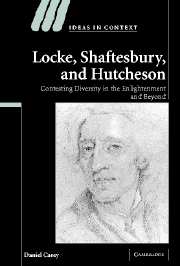Book contents
- Frontmatter
- Contents
- Acknowledgements
- Abbreviations
- Introduction
- 1 Locke, diversity, and the natural history of man
- 2 The uses of diversity: Locke's sceptical critique of Stoicism
- 3 Locke's anthropology: travel, innateness, and the exercise of reason
- 4 Contesting diversity: Shaftesbury's reply to Locke
- 5 Method, moral sense, and the problem of diversity: Francis Hutcheson and the Scottish Enlightenment
- 6 Conclusion: the future of diversity
- Bibliography
- Index
5 - Method, moral sense, and the problem of diversity: Francis Hutcheson and the Scottish Enlightenment
Published online by Cambridge University Press: 22 September 2009
- Frontmatter
- Contents
- Acknowledgements
- Abbreviations
- Introduction
- 1 Locke, diversity, and the natural history of man
- 2 The uses of diversity: Locke's sceptical critique of Stoicism
- 3 Locke's anthropology: travel, innateness, and the exercise of reason
- 4 Contesting diversity: Shaftesbury's reply to Locke
- 5 Method, moral sense, and the problem of diversity: Francis Hutcheson and the Scottish Enlightenment
- 6 Conclusion: the future of diversity
- Bibliography
- Index
Summary
Francis Hutcheson, whose work became a leading force in the philosophical and cultural movement known as the Scottish Enlightenment, devoted his first major publication, An Inquiry into the Original of our Ideas of Beauty and Virtue (1725), to a defence of the third Earl of Shaftesbury. Like Shaftesbury, he believed that mankind shared a fundamental core of moral ‘affections’ and that our ethical responses and motivations exhibited an important consistency. As a result he worried over the implications of diversity which disrupted the picture of an orderly and unified moral world. Continual testimony of savagery, corruption, and incommensurable beliefs potentially undermined the plausibility of the view that a ‘moral sense’ resided in human nature. There are reasons for suggesting that Hutcheson felt this challenge more acutely than Shaftesbury. Hutcheson democratised the moral sense and made its reach encompass all mankind. At the same time, he positioned his philosophy on a more observational basis than Shaftesbury and therefore encountered an obvious objection from reports of diversity.
Hutcheson not only adapted what he inherited from Shaftesbury, he was also well disposed towards a number of developments in natural philosophy and epistemology promoted by Locke. Finding a basis for rapprochement between these opposing figures posed a considerable problem. The intriguing tensions created by his synthesis of Locke and Shaftesbury provide the focus of my discussion.
- Type
- Chapter
- Information
- Locke, Shaftesbury, and HutchesonContesting Diversity in the Enlightenment and Beyond, pp. 150 - 199Publisher: Cambridge University PressPrint publication year: 2006

